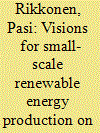| Srl | Item |
| 1 |
ID:
161502


|
|
|
|
|
| Summary/Abstract |
In this study we analyze Korea's official development assistance (ODA) projects in Sri Lanka to derive policy issues for sustainable development of developing countries. In a two-step process, we first propose improvements based on the results of ODA projects in Sri Lanka, and second derive policy issues for improvements proposed in the first step through a Delphi analysis of expert surveys. Improvements are summarized in four categories: enhancing environmental policies in developing countries through specialized ODA projects, enhancing public awareness of environmental issues through ODA projects that directly benefit citizens, increasing communication and cooperation between recipient and donor countries through jointly planned ODA projects, and implementing follow- up management of ODA projects. The results of the study not only can contribute to the effective implementation of future ODA projects but also can be used as basic data to examine when establishing national policies.
|
|
|
|
|
|
|
|
|
|
|
|
|
|
|
|
| 2 |
ID:
166507


|
|
|
|
|
| Summary/Abstract |
The future of the energy system in many countries is characterised by a balance between centralised and distributed systems. Besides producing food, farms possess biomass and open space suitable for renewable energy (RE) production. This paper presents the agricultural, farm-level opportunities for fostering RE business in Finland. The timeframe for this scrutiny is until 2030, and the Delphi method is used to analyse the possibilities, barriers and solutions for growth. The results show that among national renewable energy and agricultural experts the most preferred energy sources for increasing RE business on farms were wood (including wood chips), biogas and solar photovoltaics (PV). When asked about the most likely development, wood and biogas remained, but solar PV was changed to ‘other farm-based biomass for burning’. The expert panel recognised the potential for RE business growth in agriculture, but easy access to the energy grid and refining incentives (both in the investment and production phases) for small-scale RE production were called for. Forerunners, pilots and new innovations were considered to foster the use of small-scale energy technologies. There was a clear hope that small-scale RE production on farms would not be based on heavy subsidies, but would grow as a market-based business.
|
|
|
|
|
|
|
|
|
|
|
|
|
|
|
|